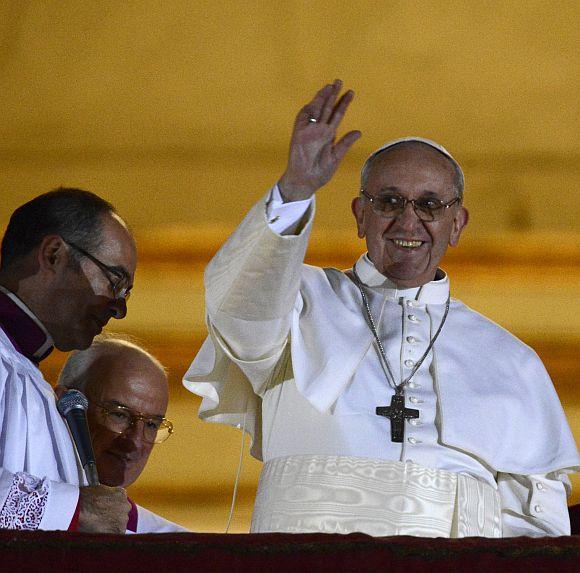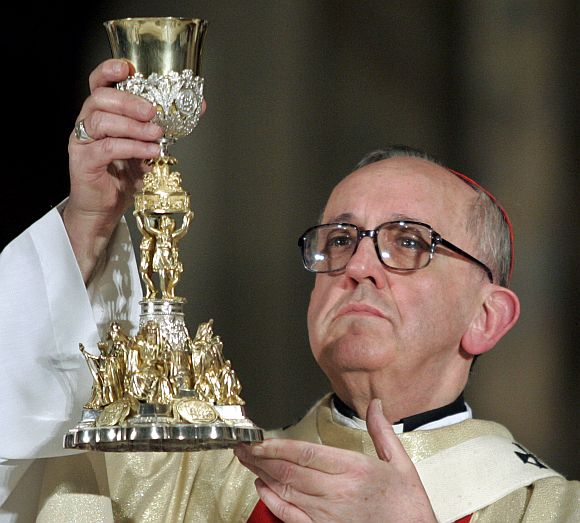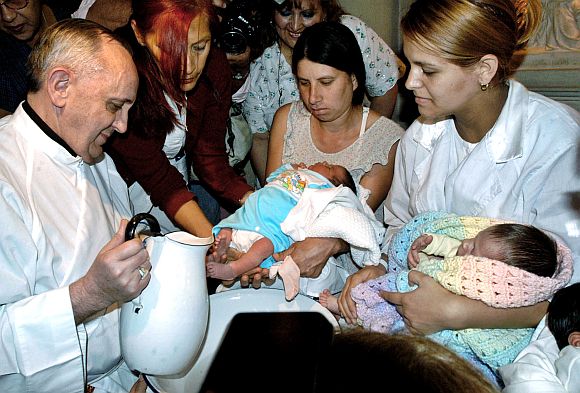
Cardinal Jorge Mario Bergoglio has been elected as the first Latin American Pope in history, taking the name of Pope Francis.
Bergoglio, 76, reportedly got the second-most votes after Joseph Ratzinger in the 2005 papal election, and he has long specialised in the kind of pastoral work that some say is an essential skill for the next Pope.
In a lifetime of teaching and leading priests in Latin America, which has the largest share of the world's Catholics, Bergoglio has shown a keen political sensibility as well as the kind of self-effacing humility that fellow cardinals value highly, says his official biographer, Sergio Rubin.
Born in Buenos Aires in 1936, Bergoglio's father was an Italian immigrant and railway worker from the region around Turin, and he has four brothers and sisters.
...

According to the National Catholic Reporter, his original plan was to be a chemist, but in 1958 he instead entered the Society of Jesus and began studies for the priesthood. He spent much of his early career teaching literature, psychology and philosophy, and early on he was seen as a rising star.
From 1973 to 1979 he served as the Jesuit provincial in Argentina, then in 1980 became the rector of the seminary from which he had graduated.
These were the years of the military junta in Argentina, when many priests, including leading Jesuits, were gravitating towards the progressive liberation theology movement.
As the Jesuit provincial, Bergoglio insisted on a more traditional reading of Ignatian spirituality, mandating that Jesuits continue to staff parishes and act as chaplains rather than moving into "base communities" and political activism.
...

Although Jesuits generally are discouraged from receiving ecclesiastical honours and advancement, especially outside mission countries, Bergoglio was named auxiliary bishop of Buenos Aires in 1992 and then succeeded the ailing Cardinal Antonio Quarracino in 1998.
Late John Paul II made Bergoglio a cardinal in 2001, assigning him the Roman church named after the legendary Jesuit St Robert Bellarmino.
Cardinal Bergoglio has had a growing reputation as a very spiritual man with a talent for pastoral leadership serving in a region with the largest number of the world's Catholics.
Since 1998, he has been archbishop of Buenos Aires, where his style is low-key and close to the people.
He rides the bus, visits the poor, lives in a simple apartment and cooks his own meals.
To many in Buenos Aires, he is known simply as "Father Jorge."
...

He also has created new parishes, restructured the administrative offices, led pro-life initiatives and started new pastoral programs, such as a commission for divorcees. He co-presided over the 2001 Synod of Bishops and was elected to the synod council, so he is well-known to the world's bishops.
The cardinal has also written books on spirituality and meditation and has been outspoken against abortion and same-sex marriages.
In 2010, when Argentina became the first Latin American country to legalise same-sex marriage, Cardinal Bergoglio encouraged clergy across the country to tell Catholics to protest against the legislation because, if enacted, it could "seriously injure the family," he said.
He called the legislation a "real and dire anthropological throwback".
In a letter to the monasteries of Buenos Aires, he wrote: "Let's not be naive, we're not talking about a simple political batt#8804 it is a destructive pretension against the plan of God. We are not talking about a mere bill, but rather a machination of the Father of Lies that seeks to confuse and deceive the children of God."